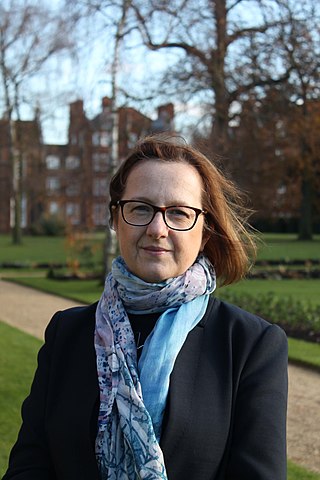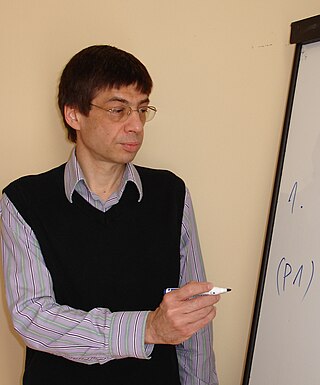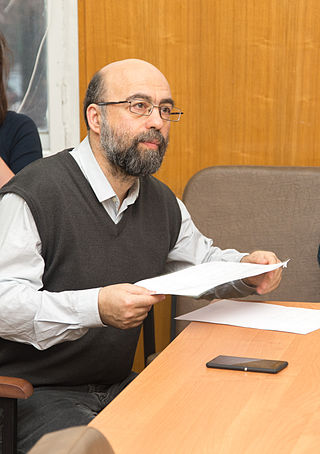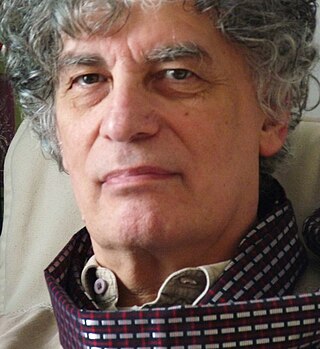Related Research Articles
In linguistics and related fields, pragmatics is the study of how context contributes to meaning. The field of study evaluates how human language is utilized in social interactions, as well as the relationship between the interpreter and the interpreted. Linguists who specialize in pragmatics are called pragmaticians. The field has been represented since 1986 by the International Pragmatics Association (IPrA).
Linguistics is the scientific study of human language. Someone who engages in this study is called a linguist. See also the Outline of linguistics, the List of phonetics topics, the List of linguists, and the List of cognitive science topics. Articles related to linguistics include:
Marianne Mithun is an American linguist specializing in American Indian languages and language typology. She is a professor of linguistics at the University of California at Santa Barbara, where she has held an academic position since 1986.

Stephen Roy Albert Neale is a British philosopher and specialist in the philosophy of language who has written extensively about meaning, information, interpretation, and communication, and more generally about issues at the intersection of philosophy and linguistics. Neale is a Distinguished Professor of Philosophy and Linguistics and holder of the John H. Kornblith Family Chair in the Philosophy of Science and Values at the Graduate Center, City University of New York (CUNY).
Stephen C. Levinson FBA is a British social scientist, known for his studies of the relations between culture, language and cognition, and former scientific director of the Language and Cognition department at the Max Planck Institute for Psycholinguistics in Nijmegen, the Netherlands.
Donkey sentences are sentences that contain a pronoun with clear meaning but whose syntactical role in the sentence poses challenges to grammarians. Such sentences defy straightforward attempts to generate their formal language equivalents. The difficulty is with understanding how English speakers parse such sentences.

Katarzyna Malgorzata "Kasia" Jaszczolt is a Polish and British linguist and philosopher. She is currently Professor of Linguistics and Philosophy of Language at the University of Cambridge, and Professorial Fellow at Newnham College, Cambridge.

Reuven Tsur was professor emeritus of Hebrew literature and literary theory at Tel Aviv University. He was born in Oradea (Nagyvárad), Romania his mother tongue was Hungarian.
Carla Bazzanella was an Italian linguist.
Alexander Kravchenko is a Russian cognitive linguist and professor at Baikal National University of Economics and Law (BNUEL), where he heads the Department of Foreign Languages. He is one of the founding researchers of the Distributed Language Group.
Anna Siewierska was a Polish-born linguist who worked in Australia, Poland, the Netherlands and the United Kingdom. She was professor of linguistics at Department of Linguistics and English Language Lancaster University and a leading specialist in language typology.
The Societas Linguistica Europaea (SLE) is a Europe-focused professional society for linguists. It was founded in 1966 to advance linguistics, the scientific study of human language. The SLE has over 1,000 individual members and welcomes linguists of all kinds. Through its website, its annual meetings, and its journals Folia Linguistica and Folia Linguistica Historica, the SLE works to disseminate current research in linguistics and facilitate communication within the discipline.

Ranko Bugarski is a Serbian linguist, academic and author.
Ziva Ben-Porat is a literary theorist, writer, and editor who lives in Israel and is a professor at Tel Aviv University.
Deborah Sue Schiffrin was an American linguist who researched areas of discourse analysis and sociolinguistics, producing seminal work on the topic of English discourse markers.

András Kertész is a Hungarian linguist, professor, full member of the Hungarian Academy of Sciences. His research focuses on the philosophy of linguistics, theoretical linguistics and foundational problems of syntax, semantics and pragmatics. He works both in Hungary and around the world, and has published in English, German and Hungarian.

Andrej Kibrik is a Russian linguist, the director of the Institute of Linguistics of the Russian Academy of Sciences, and professor at the Philological Faculty of the Moscow State University. Member of the Academia Europaea since 2013.

Vladimir Plungian is a Russian linguist, specialist in linguistic typology and theory of grammar, morphology, corpus linguistics, African studies, poetics.

István Kenesei is a Hungarian linguist, professor emeritus and corresponding member of the Hungarian Academy of Sciences. His research focuses on generative grammar, theoretical linguistics and foundational problems of syntax, semantics and morphology. He works both in Hungary and around the world, and has published in English and Hungarian.
References
- 1 2 "Mira Ariel – Tel Aviv University" . Retrieved 28 July 2022.
- 1 2 "Academia Europaea: Mira Ariel" . Retrieved 27 July 2022.
- ↑ "Academia Europaea: Mira Ariel CV" . Retrieved 27 July 2022.
- 1 2 "Mira Ariel, Ph.D." Retrieved 28 July 2022.
- ↑ "Academy of Europe: CV". www.ae-info.org. Retrieved 2022-12-31.
- ↑ "About Societas Linguistica Europaea". The Societas Linguistica Europaea. Retrieved 2022-12-31.
- ↑ Ariel, Mira. 2001. Accessibility theory: an overview. In Ted Sanders, Joost Schilperoord, & Wilbert Spooren (eds.), Text representation: linguistic and psychological aspects, 29–87. Amsterdam: John Benjamins.
- ↑ Croft, William, & Alan Cruse. 2004. Cognitive linguistics. Cambridge: Cambridge University Press, p51.
- ↑ Croft, William. Typology and universals. Second edition. Cambridge: Cambridge University Press, p179.
- ↑ Schiffrin, Deborah. 1996. Narrative as Self-Portrait: Sociolinguistic Constructions of Identity. Language in Society 25 (2), 167–203, p192.
- ↑ Sorace, Antonella. 2011. Pinning down the concept of "interface" in bilingualism. Linguistic Approaches to Bilingualism 1 (1), 1–33, p14.
- ↑ Emmott, Catherine. 2003. Reading for pleasure: a cognitive poetic analysis of ‘twists in the tale’ and other plot reversals in narrative texts. In Joanna Gavins & Gerard Steen (eds.), Cognitive poetics in practice, 145–160. London: Routledge, p158.
- ↑ Warren, Tessa, & Edward Gibson. 2002. The influence of referential processing on sentence complexity. Cognition 85 (1), 79–112.
- ↑ Webster, Kellie, and Joel Nothman. 2016. Using mention accessibility to improve coreference resolution. Proceedings of the 54th Annual Meeting of the Association for Computational Linguistics 432–437, p432.